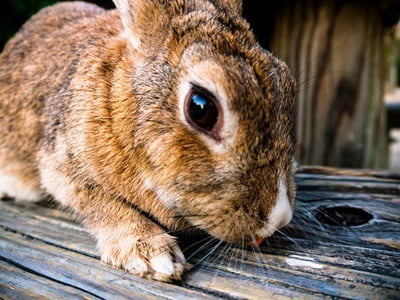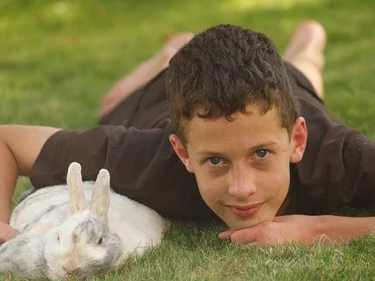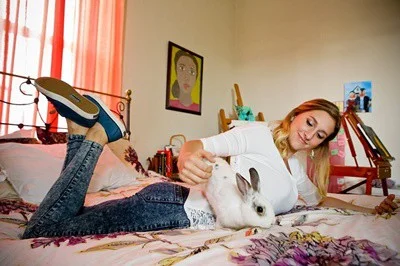Rabbits are naturally good diggers, and sometimes they will dig on their owners. This can be confusing, or even painful, if the rabbit’s claws are long. Wild rabbits dig to create warrens and tunnels that allow them to hide from predators. Domestic rabbits cannot do this, and yet they still dig on objects and people. This is regularly done as a form of communication.
A rabbit may dig on its owner because it is feeling anxious, wants to play, wants to be left alone, is demanding pets or attention, or is bored. Understanding why your rabbit digs on you will allow you to better understand ‘rabbit speak’. For example, a rabbit may dig on your chest or arms if it is anxious about being held. A rabbit may dig at your lap or feet because it wants to play. Also, depending on if it also nips or bites you, it may be trying to establish dominance.
Cute as digging may appear, it can be damaging to your clothes and skin. As such, you may wish to train your rabbit to stop digging on people. You can start by providing your rabbit with other outlets to dig on, like blankets or pet beds. Ensure the rabbit has lots of toys to prevent boredom.
Why Does My Rabbit Burrow On Me?
Burrowing and digging are very natural behaviors in rabbits. In the wild, this is how rabbits create the burrows and warrens needed for their survival. Domestic rabbits may still dig, even if they’re strictly indoor animals without access to earth. This is simply a built-in instinct that your rabbit won’t ever fully lose.
Even without dirt for tunneling, your rabbit will still use its claws and powerful legs to burrow. Bunnies will even dig on their owners. This can be confusing, but don’t worry. Rabbits are smart animals. Your pet isn’t mistaking you for pliable dirt when it scratches at you. Instead, it is trying to communicate. This leaves you with two options:
- You can discourage this behavior wholesale
- You can work to understand what your rabbit is trying to convey with this action. It may be worth granting whatever bunny-speak request it’s making
Some rabbits may dig persistently. Others may do it infrequently, or exhibit other behaviors at the same time. Commonly, rabbits will dig on:
- You
- Clothes
- Your lap
- Shoes
- Directly on your skin
Where the rabbit chooses to dig can also mean different things.

Rabbit Digging Behavior
The location of your rabbit’s digging behavior may seem arbitrary. However, it’s important to know that bunnies dig with intention. Even in the wild, it’s not an idle or thoughtless action.
For example, wild rabbits choose areas to burrow according to how safe or advantageous they are. Likewise, your pet bunny may dig on your chest, clothing, lap, or legs to send a specific message.
Rabbit Wants To Be Let Down
Most commonly, a rabbit digs on its owner’s chest when it’s being held. This means ‘let me down.’ Digging is a method of escape and defense. Even if your rabbit means no harm, it’s alerting you that it wants to be elsewhere – in the only way it can.
An anxious rabbit may dig to tell you it doesn’t want to be picked up or receive attention. An angry or stressed rabbit may do the same, and start nipping and struggling if you ignore the signals.
Rabbit Is Showing Territorial Behavior
The Journal of Exotic Pet Medicine notes that rabbits are very territorial. To display this, rabbits – and especially males – will perform a variety of behaviors. These include spraying, defecating, and chinning, all of which mark the territory through scent.
Digging isn’t necessarily a way for rabbits to mark their territory. However, a rabbit will dig if it smells another rabbit on you. Clawing and scratching is a way for the bunny to cover up and investigate this new scent.
The rabbit may also dig to see if the other animal is hiding in your clothes. This depends on how loose-fitting your clothing is and the strength of the scent.
Rabbit Is Experiencing Boredom
Without enough stimulation or toys, a rabbit will get bored or depressed (a condition which may result from boredom too). In this state, bunnies will perform destructive behaviors. Digging on you can be one of them.
Solo rabbits are at the greatest risk. Without enough enrichment or affection, they can quickly decline in mental health. If your rabbit has been confined to a lacking enclosure or hasn’t received frequent bonding sessions, it may dig on you.
Rabbit Thinks You Smell
As noted in the Journal of Anatomy, rabbits have an acute sense of smell. If you’ve just come home from the gym and haven’t showered yet, your rabbit may be telling you to fix that.
In the wild, bunnies rely heavily on scent to identify threats. New, strong, or altered scents put a rabbit on alert, as this can be a critical sign of approaching danger. Domestic rabbits still have the same instinct.
Changes in your scent, or new scents covering it, may cause the rabbit to dig on you out of anxiety or stress. Even changing your deodorant, perfume, washing detergent, or soap can cause digging.
Rabbit Is Asking to Play
Digging is also a play behavior, especially in younger rabbits. With that said, rabbits of all ages may dig on you as a way of playing, or requesting play time.
Usually, this digging is performed directly on the skin. If you are standing, it may dig at your ankles or feet as a request for you to get down on its level.
If the rabbit digs at your clothes, it may want to play with you or with its favorite blanket. This will happen more often if you wear oversized clothes or are curled under a blanket. The rabbit might be mistaking your clothes for a blanket, cushion, pillow, or rug.
Rabbit Is Feeling Anxious
As mentioned, anxiety can motivate a rabbit to dig. Aside from being picked up (which only very trusting rabbits will accept), anxiety can arise from many sources.
Bunnies are very nervous animals. Loud noises, other pets, new people, and changes to your bunny’s environment can result in a stressful or apprehensive state of mind. Although a rabbit is more likely to either flee or freeze when startled, it may also funnel anxiety into digging.
A rabbit that is persistently exposed to stressful environments may dig frequently.
Rabbit Is Showing Dominance
Digging can indicate that your rabbit thinks it’s the boss of the house. As such, it wants to decide when to play, when to cuddle, and when to receive attention.
Social as rabbits are, they are still quite independent animals. A rabbit will enjoy spending time alone, and a dominant rabbit will be very expressive when it wants this solo time. It may dig, nip, or bite as a method of telling you to ‘go away.’
Rabbit Is Showing Off
Unneutered male rabbits may begin digging when in the presence of female rabbits. This is considered a courting display. The buck is showing off its ability to create a home for the doe’s would-be litter. As such, it may dig quite vigorously.
If the rabbit happens to be in your lap when it sees the doe, it may start digging on you. It will likely do this every time it sees the doe until you have it neutered.
Rabbit Is Demanding Petting
In the same way, digging can signal ‘leave me alone,’ it can also be a demand for pets and cuddles. When a rabbit wants petting, it will usually bump its nose or head into your hand. If your hand appears to be out of reach, the rabbit may start digging at whatever part of your body it can get to. Usually, this means your feet or lap.
It is important to not reject a bunny when it’s seeking affection. Even if you are busy, give it a little scratch and verbal acknowledgement. Otherwise, your rabbit may take your rejection hard and be less interested in your attention going forward.
Something Is Wrong
Although not a common sign, a rabbit may dig to show it’s feeling unwell and wants to be left alone. Digging involves a fair bit of movement, so it’s unlikely to be a sign of impaction or GI stasis. Instead, it’s more likely a sign of an ear infection, mites, dental issues, or respiratory infection.
Monitor your rabbit for any other symptoms and take it to a vet if something arises.
How To Prevent Rabbits from Digging On You
Digging can quickly go from cute to annoying. Not only can the behavior damage your clothes, but it can also be painful to the skin. Thankfully, there are many ways to discourage this habit in your bunny.
You’ll never remove the instinct altogether, but you can teach the rabbit that you’re not an object it can freely scratch.
If the digging doesn’t bother you, and it’s not being sparked by a serious issue, then you may merely wish to clip the rabbit’s nails. Sharp claws can be a problem. This is especially true if your pet rabbit is around small children or other pets. Here are some methods to use:
Provide An Outlet
Rabbits aren’t easy to train, so you may prefer a more straightforward (and less time-intensive) approach to stop your pet’s digging. Don’t cure the habit – just provide a different outlet! By directing its attention elsewhere, you can help a rabbit that’s digging out of boredom or a desire to play.
The Veterinary Nursing Journal states that rabbits need mental and physical enrichment to lead full, happy lives. Toys and other interactive items that allow for digging are important channels for energy. They will keep the rabbit occupied, so it doesn’t grow bored and compound its destructive behaviors.
For a solo rabbit, you may need a variety of toys to keep it occupied. This may include a blanket, a log treat for munching, or a small obstacle course for it to explore. With more enrichment, the bunny will feel less need to dig at you for attention.
Play With Your Rabbit More Often
Even with plenty of toys, it is still important to actually play with your rabbit. If it is consistently asking for more play time, then it needs more attention from you. This provides mental and physical exercise, but also strengthens your bond with the rabbit.
The more connection it has with you, the more comfort and safety it will feel. Since many rabbits dig from anxiety, this can help your pet to naturally cease the behavior. Be sure to play with your rabbit on the ground, either crouching or laying down to reach its level. Looming over the bunny will only increase its anxiety if it doesn’t trust you implicitly.
With that said, it’s important to not over-stimulate the rabbit with too much play. When your rabbit begins to tire or show disinterest in playing, be sure to let it wander off and do its own thing. Allow it to come back in its own time.
Build Trust
Picking up a rabbit when it doesn’t trust you will cause a great deal of stress. This may encourage the bunny to dig at your chest or arms. That is, if it doesn’t wriggle and leap out of your arms first.
Building trust is important in rabbit ownership. Rabbits are prey animals and will consider people as threats until taught otherwise.
Building a bond and creating this essential trust will take time and patience. Until this bond has been made, don’t pick up the rabbit or discipline it. Let the bond grow naturally, and reinforce it with affection, grooming, and play as it does. As the rabbit comes to trust you, it will dig less.
Neutering
Neutering solves a number of behavioral issues in rabbits. Should digging be one of them, neutering the buck will hopefully prevent it from happening again.
Regardless of undesirable behaviors, anyone that keeps both male and female rabbits must neuter the animals. Rabbits can reproduce only months after being born, and unwanted litters will quickly appear.
Training
As mentioned earlier, rabbits are clever animals. It is possible to train rabbits out of digging behavior, with enough patience and consistency.

Create Dig-Safe Zones
This method will take time, but has the most long-term results. It involves teaching the bunny that there are acceptable and unacceptable places to dig. Rabbits will enjoy digging at blankets, pillows, and pet beds. You can also try grass matts or rugs. Provide the rabbit with one or more of these and encourage it to dig on these.
When the rabbit digs on you, gently pick it up and place it on these objects. Encourage it to dig on these instead of on you by using verbal praise. Reward it with treats as well.
In conjunction with praise, use discouragement to teach it that digging on you isn’t acceptable. Discourage the rabbit from scratching your clothes or body by gently showing your disapproval through verbal discipline.
Always be careful with verbal discipline. Too loud and it will only make the bunny fear you. Aim for a firm and level ‘no’ or ‘stop’ alongside the rabbit’s name. You can also clap your hands together to get its attention. This may take some time to sink in.
Ignore the Rabbit’s Digging
You have to ignore the rabbit’s destructive behavior. When it digs on you, place it down (if you are holding it) and turn your back to it. Rabbits are very social creatures, and body language is just as important as verbal communication.
Your rabbit will very quickly learn that this behavior is unwanted. With enough consistency (and displeased reactions from you), the rabbit may learn to stop the behavior to gain your approval again. Be sure to reward it as it learns!
Your Rabbit Digs On You To Communicate
Rabbits may dig on their owners to communicate a number of things:
- Playing
- Releasing energy
- Showing signs of anxiety
- Being jealous
- Asking for cuddles
- Rejecting touch
Digging itself is a natural behavior. Rabbits can be taught to stop digging, or to only dig on certain objects instead of people. In any case, just remember: Your rabbit is trying to tell you something.
Once you learn to bridge the communication gap, you can take the best steps to make sure you both reach a happy compromise.

